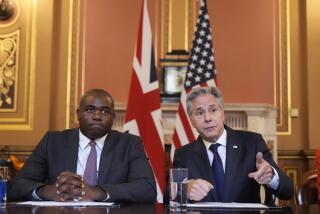China Vows Missile Sales to Iran Have Been Halted
- Share via
BEIJING — Defense Secretary William S. Cohen said today that he has won new assurances from top military officials here that China has halted sales of anti-ship cruise missiles to Iran.
At a news conference this morning in Beijing, Cohen declined to offer details regarding his extensive talks with Defense Minister Chi Haotian and other officials.
However, the American civilian military chief said he was “satisfied with the assurances I was given that there would not be any continuation of the sales that would contribute to insecurity of our troops in the [Persian Gulf] region.”
China’s sale of the C-801 and C-802 missiles has been a sore point in U.S.-China relations.
In a summit with President Clinton in Washington in late October, Chinese President Jiang Zemin had pledged to cut off the missile sales. A similar pledge was made by Foreign Minister Qian Qichen to Secretary of State Madeleine Albright.
But Cohen came to Beijing this weekend hoping to clear up what he described as “ambiguities” in the Chinese position.
Did China, for example, intend to cut off sales after it had delivered missiles already in the pipeline? Or was China willing to cut off the supply immediately?
After raising the issue with Chi on Monday, Cohen, according to an aide, came away “pretty satisfied that the sales were over.”
In talks with Chi and several top generals, Cohen stressed the U.S. determination to eliminate potential dangers to its ships in the Gulf.
He said that, if an incident was to occur involving the use of Chinese missiles, it would redound badly on China. He also noted that China, which now imports oil from the Gulf, has a stake in maintaining peace in the region.
“He was extremely pleased with the answers he got,” said an official traveling with Cohen.
The secretary of Defense has one important meeting left on his schedule before leaving China, a talk this morning with Jiang at the Zhongnanhai leadership compound. The Chinese news media have been giving prominent display to the visit, the first by an American Defense secretary since William J. Perry came here in 1994.
In general terms, Cohen said the purpose of his four-day visit was to “deepen, broaden and advance military contacts” between the two countries.
In what he said was another level of military cooperation, Cohen cited the U.S. Air Force delivery last week of 40 tons in relief supplies to Chinese earthquake victims.
He said military relations, which hit a low point after the 1989 military crackdown on demonstrators in Tiananmen Square, have now advanced to the point where officers from the two countries are prepared to join in “table top” theoretical strategic exercises. He said this is the first step toward joint full-scale exercises.
However, Cohen said the relationship has not evolved to the point where the U.S. is willing to lift sanctions, imposed after 1989, banning the sale of military equipment to China. The Defense secretary declined comment on reports that he favored allowing the sale of Sikorsky helicopter parts to the Chinese military.
In 1996, U.S. military officials showed their good faith in the relationship by allowing Defense Minister Chi to tour the high-tech National Military Command Center in the heart of the Pentagon. Other Chinese officers have been given tours of the North American Air Defense Command in Cheyenne Mountain, Colo.
In a mostly symbolic return gesture by the Chinese military on Monday, Cohen and his delegation--which included Adm. Joseph Prueher, commander of U.S. Asia-Pacific forces, and Assistant Secretary of State Stanley Roth--were taken on an unprecedented tour of a top-secret air defense center on the southeast edge of Beijing.
Although certainly not state-of-the-art by American standards, the seven-story facility in a drab, nondescript neighborhood of the capital was, as the American visitors described it, an impressive mixture of old and new technology.
The Capital Air Defense Command Center was described by Chinese military officers as the main facility for tracking the movement of aircraft over Chinese skies.
Before their two-hour talk, Cohen and Chi also signed a military maritime consultation agreement designed to lower the risk of accidental military incidents between U.S. and Chinese warships. The need for the basic agreement was demonstrated in 1996 when the U.S. aircraft carrier Kitty Hawk had a tense encounter with a Chinese submarine in international waters off the Chinese coast.
The pact calls for annual meetings between senior military officials. “The agreement demonstrates the maturing relationship between our militaries,” Cohen said.
Meanwhile, Albright said Monday that China’s decision to allow a visit by Mary Robinson, the top United Nations human rights official, was a positive step but that more movement was required.
More to Read
Sign up for Essential California
The most important California stories and recommendations in your inbox every morning.
You may occasionally receive promotional content from the Los Angeles Times.








